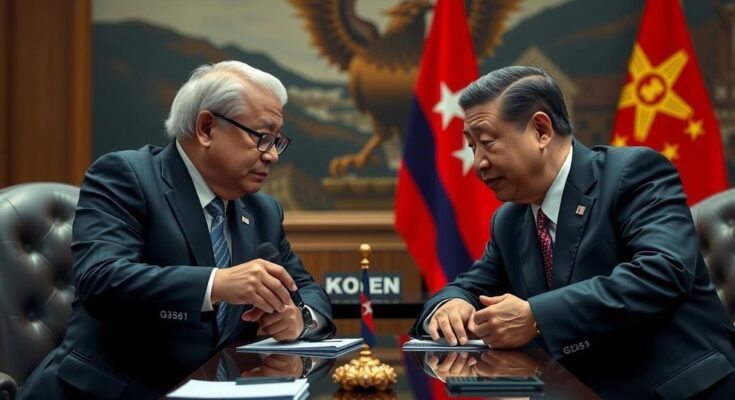President Biden is set to engage in critical discussions with Xi Jinping at the APEC summit in Peru, focusing on urging China to help curb North Korea’s military support for Russia. This meeting marks Biden’s last with Xi before the transition to a Trump administration. The talks will address wider geopolitical issues, amid increasing tensions between North Korea and the U.S. allies in East Asia.
In the context of the Asia-Pacific Economic Cooperation summit held in Lima, Peru, President Joe Biden is set to engage in crucial discussions with Chinese President Xi Jinping. The primary focus of their talks will be to persuade China to take a more active role in curbing North Korea’s support for Russia amidst the ongoing conflict with Ukraine. This meeting marks a significant moment as it is Biden’s last official dialogue with Xi before he vacates the White House, with the incoming administration of Donald Trump anticipated to alter the dynamics of U.S.-China relations significantly. During this pivotal encounter, officials have indicated that Biden will urge Xi to exert greater influence on North Korea, particularly following its alarming commitment to assist Russia militarily, which Biden has labeled as “dangerous and destabilizing cooperation.” The alignment between North Korea and Russia has escalated tensions in the region, and Biden is expected to emphasize that such dynamics run counter to China’s interests. Recent trilateral conversations involving Biden, South Korean President Yoon Seok Yul, and Japanese Prime Minister Shigeru Ishiba have underscored a unified stance against North Korea’s actions and an appeal for greater Chinese intervention. Furthermore, the discussions on Saturday will also touch upon broader issues affecting U.S.-China relations, including technology competition, human rights, and military provocations surrounding Taiwan and the South China Sea. Notably, Biden’s longstanding rapport with Xi, which developed during their respective vice-presidential tenures, is expected to play a critical role in framing these discussions as Biden seeks to leave a lasting legacy in U.S. foreign relations. The future trajectory of U.S.-China relations remains uncertain with the impending transition to a Trump administration, which has signaled intentions of adopting more aggressive economic policies, including potential tariffs on Chinese imports. Meanwhile, preparations for the meeting have entailed extensive diplomatic maneuvers, with Biden’s national security adviser advocating for a proactive approach to manage competition with China. As Biden prepares to conclude his political career, this meeting embodies a significant opportunity to address pressing geopolitical challenges and foster cooperation in an increasingly complex global landscape.
As tensions persist on the global stage, the relationships involving North Korea, Russia, and China have become increasingly complex. North Korea’s alignment with Russia amidst the latter’s military engagements in Ukraine raises alarm in the international community, particularly among U.S. allies in East Asia. President Biden’s recent discussions with key regional leaders underline the urgency of addressing North Korea’s military support for Russia, while simultaneously managing the consequential U.S.-China relationship characterized by competition and potential conflict over various geopolitical issues. The upcoming meeting between Biden and Xi represents both a culmination of diplomatic efforts and a last-minute opportunity to influence the course of these relationships before the shift in U.S. presidential leadership.
In conclusion, President Biden’s final meeting with President Xi Jinping is critical not only for addressing North Korea’s destabilizing actions in support of Russia but also for navigating the complex web of U.S.-China relations as Biden prepares to exit office. The talks highlight the shared concern among the U.S. and its allies regarding North Korea’s military ambitions and its implications for regional security. As the Biden administration seeks to pivot these discussions towards collaboration, the evolving political landscape under a Trump presidency raises questions about the future of these critical international dynamics.
Original Source: apnews.com




